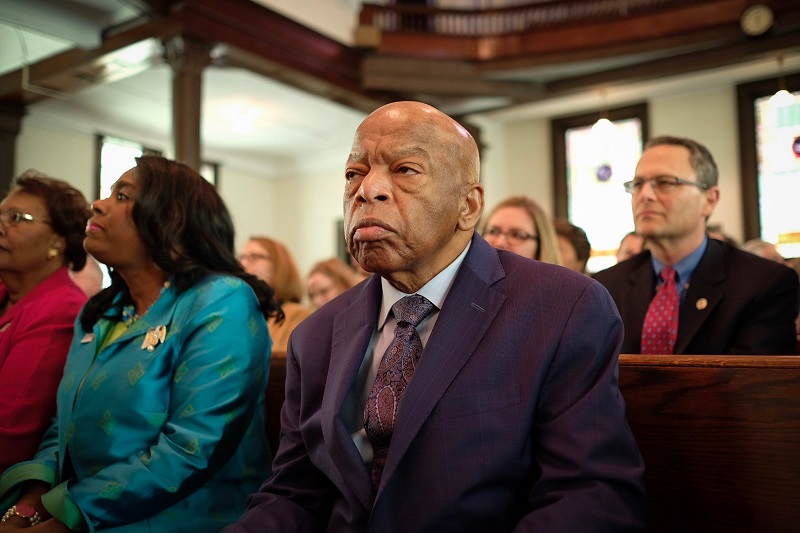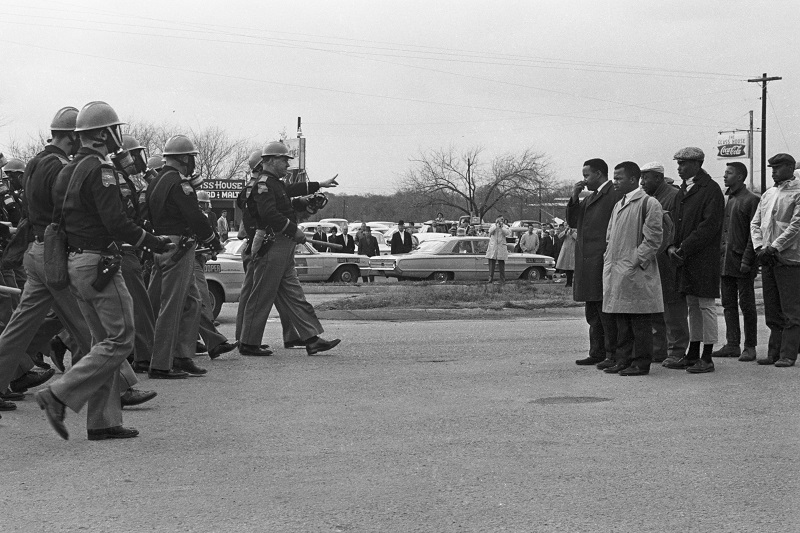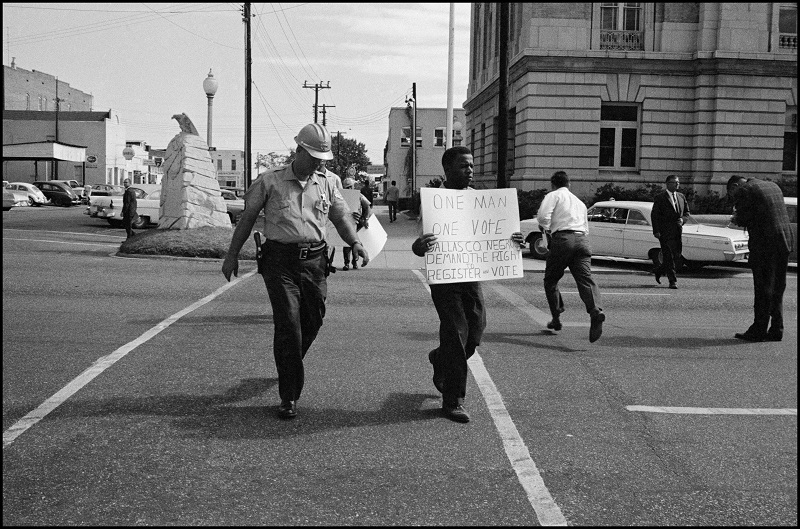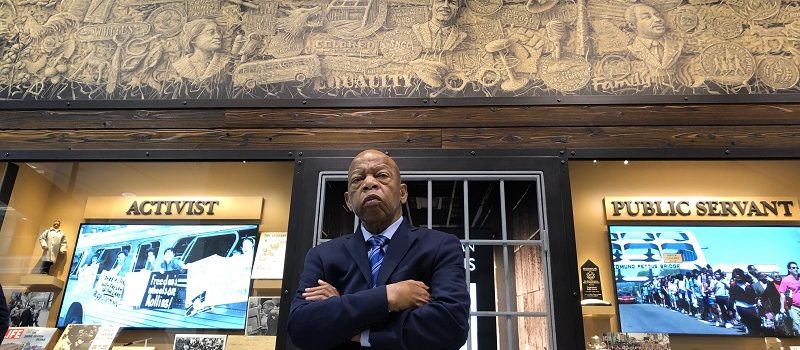When it comes to cinematically chronicling a titan of the human race, having focused your lens on another equally astounding individual certainly helps. That is firmly the case with the documentary John Lewis: Good Trouble. The film, available July 3 on VOD, comes from director Dawn Porter and producer Laura Michalchyshyn, who collaborated on the revered Netflix four-part docuseries Bobby Kennedy for President. Amongst its dignitaries speaking to RFK’s upper-echelon place in American history was … John Lewis, current Democratic Representative from Georgia, and a civil rights legend.

Lewis’ message has been steadfast and sure for over six decades. It’s simple, really, and yet quite biblical—treat others as you would want to be treated. Tragically, that humane sentiment has not been found historically on the road of equality and justice for all in this country. John Lewis: Good Trouble establishes the public servant and hero to millions as someone whose seeds of service were planted early as he preached the good word to his family’s chickens. Talk about a tough crowd.
A letter he penned to Dr. Martin Luther King Jr. in 1957 changed his life. He landed by the civil rights leader’s side, marching with him to Selma—and almost paying for it with his life. Lewis also famously stood with Dr. King on The March on Washington and got the opportunity to speak to millions as he honed his own message. It was an impassioned speech, firmly rooted in his innate desire to change the world for his people, and thus, all walks of life. Those two are firmly intertwined in the mind of John Lewis, one of many revealing aspects of John Lewis: Good Trouble.
The greatest joy that arises from witnessing the documentary emerges from instances that other filmmakers may have perceived as a so-called throw-away. There are brief, seemingly countless, moments featuring average folks stopping Lewis. Whether navigating the airport, walking the streets, working at the Capitol Building in D.C., or at political rallies, people are visibly humbled and beyond appreciative to be in his presence. Each shares something special, their desire to thank Lewis for his service, his sacrifice, and even for simply being him. It’s an astounding and powerful touch to the documentary. Sure, directors can script these meetings. But one cannot predict raw emotive responses from the simple act of physically sharing space with the man who embodies what it means to live and breathe American civil rights. It’s piercingly riveting and emerges from the facial reaction of numerous souls who are beyond moved to be in the presence of greatness.
Throughout the documentary, Porter wisely utilizes an informative interview she conducted with Lewis. His insight is rich and adds layers to whatever the subject of the moment is, or the moving images from the past or present that were just seen. Lewis talks about how he has been arrested 44 times and then takes it a step further, admitting that he still has one or two more in him before he calls it a day. That’s how this film got its name. His mother and father instilled in him the idea that there’s Good Trouble to be gotten into, and that’s exactly what their son has done since he left his native Troy, Alabama for Atlanta all those years ago. When one is fighting for what’s right, history will judge what you did as worthy and even righteous. When you’re on the side of justice, one is never wrong—even if the established laws paint you as a lawbreaker.
John Lewis: Good Trouble, in its titular mission statement, recalls what Margaret Nagle stunningly achieved with her script for The Good Lie (which was brilliantly directed by Philippe Falardeau). As illustrated in Good Trouble, there is a time and a place for utilizing a Good Lie—i.e. when the greater good reaps benefit from an activity or action that society has deemed illegal at that point in time. Whereas Nagle’s tireless research into the Second Sudanese Civil War enlightened the world to the Lost Boys, Porter paints her strokes of inspiration with the wise words of her subject and those lucky enough to cross paths with the trailblazer. The current and archival interviews frame his 65-year crusade to better lives. Adoration and appreciation for Lewis’ actions, sacrifices, timeless and continually timely messages to humanity only grows exponentially from the chats with each family member, statesmen and stateswomen, including the late Elijah Cummings and President Barack Obama.
Filmmakers wisely included a storyline centered around the 80-year-old and his recent efforts to help “Win Back the House” in 2018. It was a successful endeavor, but it involved quite a few miles traveled for the new octogenarian. Lewis is seen in Texas, Georgia, and points across this great land of ours, taking the hastily put together stage and grabbing the microphone to do what he has done since his teen years turned into his twenties. He is speaking truth and speaking truth to power. As painted in the film (and current events!), it’s never been more important than now. The timing of the film could not be better.

“Democracy is under attack,” he warns in John Lewis: Good Trouble. He’s not wrong. The evidence is all there. It’s just that Americans have, somehow, collectively ignored that fact. Others are also fighting for voting rights, that are currently under attack—the same exact thing that spurned Lewis to action 65 years ago. We need him now more than ever.
Now, as millions have taken to the streets in the name of Black Lives Matter, Lewis has been there once again, despite his serious cancer, sharing his powerful message with his typical modesty. Although the tragedy of the George Lloyd murder occurred after Good Trouble wrapped, the sentiment that spurred millions to protest on America’s streets, both big and small, permeates throughout Porter’s film.
Witnessing her latest in a long line of must-see docs, knowing what is happening in America, circa July 3, 2020, one is overcome with an emotionally-potent sense that achieving justice for all is, now more than ever, achievable. John Lewis: Good Trouble intensely inspires as it spotlights that the painful and deadly process it takes to make real change. Listening to Lewis at 80 discuss his hopes and dreams that still remain, one is motivated to do what is necessary to make his harrowing journey worth the cost.

Lastly, for those that wonder, Porter included that divinely delightful moment when Rep. Lewis went viral for his blissful dance to Pharrell William’s Happy. The man can dance! Is there anything Lewis cannot do?
Grade: A+
To help register voters in areas with voter suppression, please visit MakeGoodTrouble.com.

